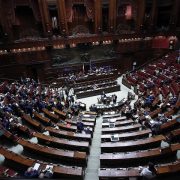La vittoria di Donald Trump quattro anni fa fu dovuta probabilmente per lo più a due elementi che oggi sembrano venire entrambi a mancare, cambiando quindi la delicata alchimia del potere americano e mettendo la politica internazionale USA in una posizione delicata.
Uno degli elementi fu attrarre votanti come “uomo contro il sistema”, rispetto al “sistema” personificato da Hillary Clinton, moglie di un ex presidente e terminale di interessi importanti del Paese. Il voto per Trump voleva anche essere uno schiaffo contro l’establishment.
Oggi però Trump stesso è il sistema, ed è tutto quello che non funziona nel sistema perché semplicemente è il presidente. Quindi quel voto potrebbe venire meno.
Un’altra, più importante fonte di sostegno è il quello che Trump trova nell’America profonda, tradizionalista, intimorita dalla perdita di identità per l’arrivo di immigrati, del proprio contributo a un ordine mondiale che pare impoverire gli USA anziché arricchirlo. Ma questo blocco di consenso potrebbe essere stato già intaccato dalla crisi in corso e potrebbe cedere ancora di più nei mesi prossimi.
Con circa 40 milioni di disoccupati, circa 100mila morti di Covid (che a novembre potrebbero essere 150-200mila o più), i più grandi disordini razziali dai tempi della guerra del Vietnam e la più grande crisi economica della storia del capitalismo, quanti del blocco di sostegno di Trump lo voteranno a novembre? E quindi come vincerà le elezioni?
Durante queste proteste la Borsa ha tenuto. Ciò può significare una fiducia per Trump ma forse anche una fiducia al vantaggio che ha oggi il suo rivale Joe Biden, in testa del 10% nei sondaggi.
Le proteste, in gran parte pacifiche, per l’uccisione da parte della polizia di un afroamericano, dicono come l’America senta ancora fortissima la spaccatura della ferita razziale. Ma soprattutto, queste dimostrazioni, gli attacchi ai negozi, la violenza sono i moderni assalti per il pane manzoniani.
Infatti i morti per Covid hanno colpito in particolar modo la parte più povera della popolazione, quella che non ha una casa in campagna dove riparare in quarantena, che ha accesso scarso o nullo alla sanità e che oggi ha perso il lavoro o ne ha uno molto precario.
Per questi, senza nulla perdere, con la fine di ogni lavoro legale o illegale (perché il Covid ha colpito anche l’economia illegale) l’attacco al negozio, praticamente a man salva, è anche un modo di vivere, non solo rabbia.
Non solo Trump
Questo poi non riguarda solo l’America. Negli ultimi due anni c’è stato uno scivolamento sempre più rapido verso un confronto duro degli Stati Uniti con la Cina, che ha cambiato gli equilibri politici globali. L’idea della Brexit, per esempio, era basata sul presupposto di rapporti fluidi e positivi tra USA, UE e Cina. In questo triangolo, un UK più libero da certi vincoli europei, avrebbe potuto giocare un ruolo speciale di grande facilitatore. Ma un appiattimento del confronto USA-Cina costringe UE e UK a scegliere da che parte stare. La UE si schiererà quindi sempre più con gli USA e in ciò per mille motivi il Regno Unito sarà più utile per sé e altri dentro la UE anziché fuori.
Inoltre, specie se nell’ambito di un confronto con la Cina, gli Stati Uniti non possono apparire “illiberali” perché perderebbero alcune delle loro armi più importanti con Pechino: la difesa della libertà, dell’essere giusti, a favore di una giustizia equa, non a difesa del potere e dei ricchi.
Circa 50 anni fa la perdita della superiorità morale in America e in Occidente, con le dimostrazioni contro la guerra del Vietnam, spinsero molto al ritiro delle truppe dall’Indocina. Ciò fu un momento molto pericoloso e delicato della guerra fredda nella quale l’Occidente ebbe timore di perdere tutto. Solo l’accordo con la Cina di Nixon nel 1972 e l’appoggio ai Mujaheddin in Afghanistan contro i sovietici alla fine degli anni ’70 rovesciarono questa situazione.
Oggi un presidente che appare divisivo come farà a unire l’America e gli alleati mondiali sulla Cina in questo momento? O lui cambia e riesce a ottenere il sostegno dell’altra metà del Paese, oppure ci vuole un altro presidente, oppure ancora gli USA vanno in questo momento a una sfida zoppi.
Al di là delle divisioni su Trump, c’è un consenso generale che tutta la serie di eventi americani ha iniziato con l’arrivo del virus dalla Cina.
Half or double Trump
Donald Trump’s election victory as US president four years ago seems to be due largely to two things that may be missing today. This therefore seems to change the alchemy of American power and puts US international policy in a delicate position.
One of the elements was voters’ attraction to Trump as a “man against the system”, compared to the “system” personified by Hillary Clinton, wife of a former president and connected to many of the country’s important interests. A vote for Trump was also meant to be a slap in the face against a certain US establishment.
Today, however, Trump himself is the system, and he represents everything that doesn’t work in the system simply because he’s the president – so that anti-establishment vote could fail.
Another important source of support for Trump came from deep, traditionalist America, unsettled by the loss of identity caused the arrival of new immigrants, and alarmed by a world order that they do not understand well, in which the US seems to impoverish instead of enrich them. This consensus may have already been undermined by the ongoing crisis and could yield even more in the coming months.
With about 40 million unemployed, about 100,000 deaths from Covid (which by November could be 150,000–200,000 or more), the largest racial unrest since the Vietnam War, and the biggest economic crisis in the history of capitalism, how many of Trump’s old voters will support him during the next election in November? How will he win?
During the protests, the stock exchange held. That may mean confidence for Trump but perhaps also confidence in his rival Joe Biden, who now leads by 10% in the polls.
The largely peaceful protests over the police killing of an African American show that America still feels the racial wound. In addition, these demonstrations, attacks on shops, violence are the modern bread riots, described in Manzoni’s novel The Betrothed, when he tells the outcomes of the plague in Milan in the 17th century. They are the frustration, the desperate poverty of being excluded from all hope, and the cannon fodder of the crisis.
In fact, the deaths from Covid have particularly affected the most destitute part of the population, those who do not have a house in the countryside in which to quarantine, who have little or no access to health care, and who today have lost their jobs or have a very precarious one.
Now, they have nothing to lose. With the end of many legal or illegal jobs (because Covid also hit the illegal economy), for some the attack on the stores, protected under the guise of the “racial riot”, is also a way of life, not only anger.
Cross the Rubicon
In this situation, the announcement of deploying troops was likely to be a risky move. Soldiers are often recruited among the disenfranchised. A career in the army is a dignified way out of poverty. So, thinking of deploying troops against civilians could further split the United States. US soldiers are traditionally the instrument of the state, not the government, against an external threat, and for this reason they have not been used in the US for many years.
If they intervene today, they risk becoming an instrument of this government against a part of its own population. That is, they actually would take sides in the political debate. They’d become partisan, of a party, not of the state in its general interest.
For example, in China itself, the issue of the relationship between the army and the ruling Communist Party has been at the center of a very heated internal debate over the years surrounding the intervention of troops against the student demonstratorsin Tiananmen in 1989. Of course, everything is very different in America, but it is worth remembering that the Chinese debate took place when in fact the party and army were created and developed in an integrated way during the revolutionary war in the 1930s and 1940s. Even then many soldiers felt uneasy cracking down on students and common people to protect the ruling party
In America, however, parties and the army have always been separate, and the army has been a point of national unity beyond party divisions.
If, as it is clear these days, the troops are reluctant to intervene, the president, who ordered their intervention becomes weaker because he was not obeyed. If the soldiers were actually deployed this obviously would create a dangerous split between the army and the people. In a way the intervention of the army against the demonstrators, backed by the opposition, could look like Caesar crossing the Rubicon with his army ready to crush the opposition in Rome.
Yet this time troops could be disloyal to Caesar. Some 40% of the military is black, so they objectively sympathize with the cause against racism, and so do many of their white comrades. Finally, with the use of the military, there is friction between troops and local authorities who may or may not support the intervention of the military.
Protests are also about China
This isn’t just about America. Over the past two years, there has been an increasingly rapid slide toward a hardline confrontation between the United States and China that is rapidly changing the global political balance.
The idea of Brexit, for example, was based on the assumption of fluid and positive relations between the US, the EU, and China. In this triangle, the UK, freer from certain European constraints, could have played a special role as a great facilitator. But the gradual flattening of the US-China confrontation forces the EU and the UK to choose sides. The EU will therefore increasingly side with the US and, for many reasons, the UK could be more useful to itself and others within the EU than outside.
Moreover, especially in the context of a confrontation with China, the United States cannot appear “illiberal” because it would lose one of its most important weapons with Beijing: the appeal of its founding values. They are, for example, the defense of freedom and of being just, in favor of fair justice, and not in defense of power and the rich.
About 50 years ago, the loss of at least partial moral superiority in America and the West, with demonstrations against the Vietnam War, was an important element that prompted the withdrawal of troops from Indochina. This was a very dangerous and delicate time in the Cold War, when the West was afraid of losing everything. Only Nixon’s first agreement with China in the early 1970s and support for the mujahideen in Afghanistan against the Soviets in the late 1970s reversed this situation.
Today how will a divisive president unite America and its allies over China right now? Either he changes and manages to win the support of the other half of the country or the country needs another president, or will the US end up with a lame duck president right now and in the future, if re-elected? Or can the state apparatus channel and “train” Trump for the next stretch as president?
There is also suspicion in America that Trump is willing to violate the rules of the Democratic game.
«But Mr. Trump does have a burning desire to be re-elected. In his mind defeat would lead to the dismantlement of the Trump Organization and his prosecution and possible imprisonment. Faced with a choice between sabotaging American democracy or a future spent in and out of courtrooms, I have no doubt where Mr. Trump’s instincts would lie. It would be up to others to stop him».[1]
However, even if Trump is defeated, the “Trumpism”, the mindset of anti-system traditionalism,is not over and could become radicalized and worsen. American establishment must therefore speak with those who feel less and less part of the “mainstream”, feel excluded, marginalized and are almost Siamese yet opposing brothers of the impoverished classes of the big cities.
Among some “anti-Trump” factions began the narrative that China wants Trump’s re-election because he is a divisive president and weakens America in comparison with China. This narrative could be very risky as it exacerbates the tensions and the bilateral differences among anti-Trumpers but also Trumpians, who will want all the more prove to be “anti-communist”.
Here, in fact, beyond the divisions over Trump, there is a general consensus that the whole series of recent American misfortunes began with the arrival of the virus from China.





